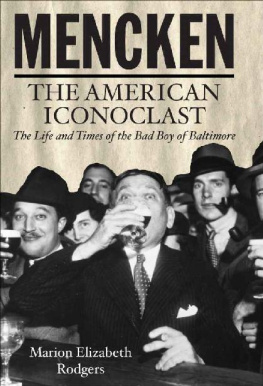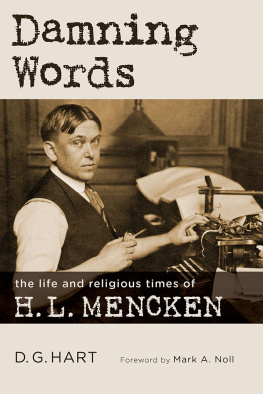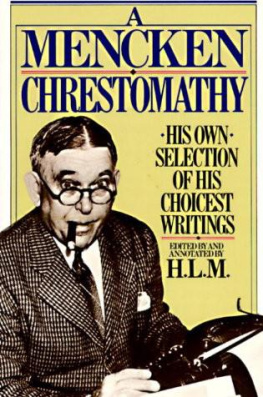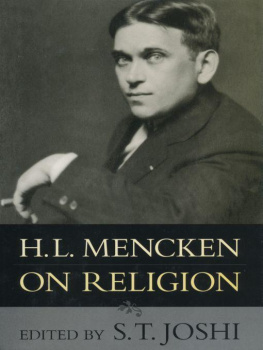Marion Elizabeth Rodgers - Mencken: The American Iconoclast
Here you can read online Marion Elizabeth Rodgers - Mencken: The American Iconoclast full text of the book (entire story) in english for free. Download pdf and epub, get meaning, cover and reviews about this ebook. year: 2005, publisher: Oxford University Press, genre: Detective and thriller. Description of the work, (preface) as well as reviews are available. Best literature library LitArk.com created for fans of good reading and offers a wide selection of genres:
Romance novel
Science fiction
Adventure
Detective
Science
History
Home and family
Prose
Art
Politics
Computer
Non-fiction
Religion
Business
Children
Humor
Choose a favorite category and find really read worthwhile books. Enjoy immersion in the world of imagination, feel the emotions of the characters or learn something new for yourself, make an fascinating discovery.
- Book:Mencken: The American Iconoclast
- Author:
- Publisher:Oxford University Press
- Genre:
- Year:2005
- Rating:4 / 5
- Favourites:Add to favourites
- Your mark:
Mencken: The American Iconoclast: summary, description and annotation
We offer to read an annotation, description, summary or preface (depends on what the author of the book "Mencken: The American Iconoclast" wrote himself). If you haven't found the necessary information about the book — write in the comments, we will try to find it.
Here is the definitive biography of Mencken, the most illuminating book ever published about this giant of American letters. We see the prominent role he played in the Scopes Monkey Trial, his long crusade against Prohibition, his fierce battles against press censorship, and his constant exposure of pious frauds and empty uplift. The champion of our tongue in The American Language, Mencken also played a pivotal role in defining the shape of American letters through The Smart Set and The American Mercury, magazines that introduced such writers as James Joyce, F. Scott Fitzgerald, and Langston Hughes.
**
From Publishers WeeklyStarred Review. For much of the early 20th century, H.L. Mencken (18801956), aka the Baron of Baltimore, was the countrys most famous pundit, inspiring both love and fear and sometimes an equal measure of both. As novelist Richard Wright noted, He was using words as a weapon. His targets were only the biggest issues of his day: Prohibition, puritanism and censorship. Even now, almost 50 years after his death, many of Menckens political insights hold true, such as this gem: Nations get on with one another, not by telling the truth, but by lying gracefully. Yet as Rodgers shows in this thorough work, Mencken was more than a newspaperman and prolific author; in 1924, he foundedand continued to editthe highbrow (and popular) monthly magazine The American Mercury, which printed pieces by F. Scott Fitzgerald and Langston Hughes (at a time when most white editors would have nothing to do with black writers). But Rodgers, editor of Mencken and Sara: A Life in Letters and The Impossible H.L. Mencken, doesnt shy away from her subjects faults; she examines Menckens anti-Semitism and his unsettling devotion to Germany (the land of his ancestors) even as the shadow of the Nazi Wehrmacht fell on Europe. Drawing on research in more than 60 archives (including previously unseen private collections in the U.S. and in Germany), exclusive interviews with Menckens friends and his love letters, this is a meticulous portrait of one of the most original and complicated men in American letters. Photos. (Oct.)
Copyright Reed Business Information, a division of Reed Elsevier Inc. All rights reserved.
Starred Review Just before graduating from Goucher College, Rodgers came upon a box of love letters between alumna Sara Haardt and author H. L. Mencken. The discovery opened doors into the fascinating life of an iconic American writer and social commentator. With obvious affection for her subject, access to untapped sources, and interviews with Menckens friends and enemies, Rodgers offers an absorbing look at the bad boy of Baltimore who grew to international fame and influence. Mencken started his career at the Baltimore Herald but went on to write The American Language and to contribute to shaping the American literary scene. Along the way, he introduced such writers as James Joyce and F. Scott Fitzgerald. Rodgers details Menckens sexual appeal and several long affairs before marrying Haardt, whose illness and death foreshortened their happy marriage. Menckens wit and piercing insight, ardent defense of press freedom, and love of the common man and language were imprinted on his writing as he covered and commented on everything from the Depression to Prohibition, all the while railing against pieties that covered social injustice. Rodgers conveys the high spirits and complexity of an American iconoclast and the turbulent times in which he lived. Vanessa Bush
Copyright American Library Association. All rights reserved
Marion Elizabeth Rodgers: author's other books
Who wrote Mencken: The American Iconoclast? Find out the surname, the name of the author of the book and a list of all author's works by series.










